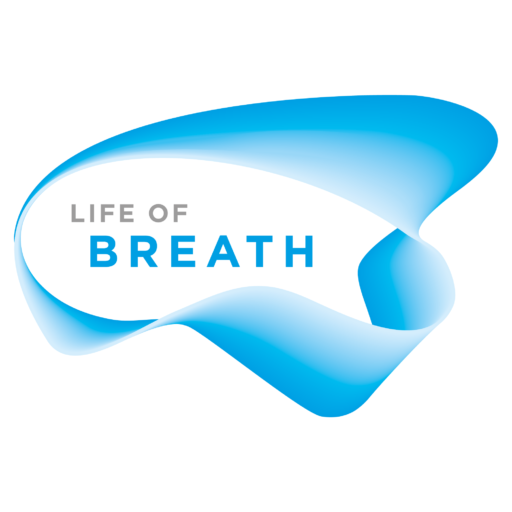Letter to my lungs
Elspeth Penny is an arts, health and communication specialist. She has a letter writing project and a creative consultancy and writes, directs and acts across several platforms. She writes:
‘My Dear Breath, I have lived with you for 83 years, the first 23 were good! but you have been unkind’ – one eighty-five year-old, Clare, writes to her own breath in large pink letters – she’s been using beetroot ink and a feather to write with. She tells me she had Asthma since she was a child: ‘I used to wonder if I’d wake up dead.’
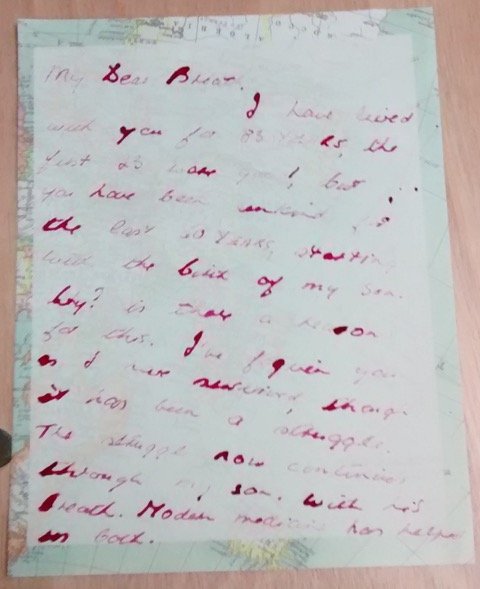
It’s the first time I’ve been to the Forest of Dean. I get to Great Oaks Hospice, Coleford an hour early. A man is cleaning a lawn mower, whistling away, and I feel at ease. I consider how I’d not mind spending time at any hospice if I could hear someone going about his tasks so happily. He helps me carry in four boxes and several bunches of coloured rolled-up paper into a warm open room in the basement.
I have arranged to do something for the first half of the meeting for Forest of Dean Breathe Easy group. Mike Green is Secretary of the group; he and his wife greet me, and then the participants begin to arrive.
‘This looks interesting, intriguing!’ says one slim, friendly man, Archie. The table is all set with tablecloth, homemade inks, pens, pencils, chalks, charcoal. There is something about him that reminds me of my Geordie grandfather, Grumpy. Grumpy had chronic bronchitis from years of dedicated smoking and spent the last fifteen (or was it twenty?) years of his life looked after by Gran; he was largely bedridden towards the end. As we start the workshop, there are six people at the table, and a few more trickle in until we are thirteen. I introduce myself and tell the group how I have developed my letter-writing project Scent. I warm up with a drama exercise using the breath, play a specific kind of consequences, appropriate for the group, ask everyone to write five messages to their five-year-old self in the past, then ask everyone to write a letter to their own breath.
Mark is a jovial man whom I immediately feel at ease with: he chats to me about parenting boys and various theatre pieces he’s seen. ‘I wrote a letter to my lungs, actually,’ he tells me. He has written, ‘We are behind you with this’ at the bottom of his chosen piece of humble white A4 paper. He continues, ‘It has helped me to be less critical of myself. That’s because of the five messages that you asked us to write to ourselves as a child.’ It’s harder to be mean to a child, so addressing ourselves this way does tend to help us be more compassionate with ourselves.
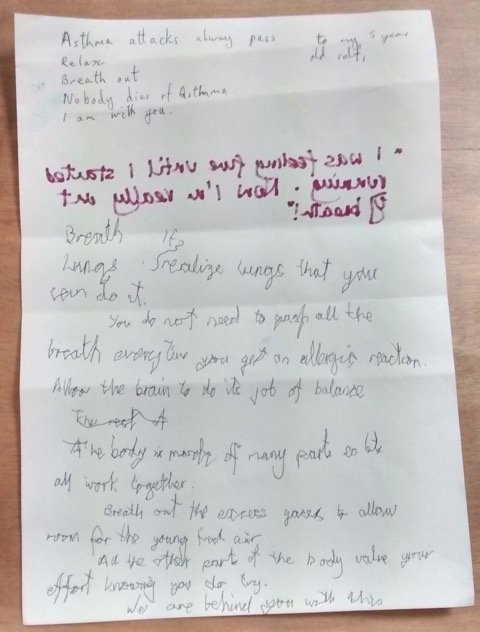
‘My letter is basically all about what breath and I can do together’, Clare tells me, with a little regret in her voice. She then says more cheerfully, ‘This is another way we look at ourselves and our illnesses – there is a lot we can do without medication.’
Everyone reacts to the workshop in their own individual way. Participants talk to their breath in tones ranging from kindness and friendship to reprimand, such as Clare’s (‘But you have been unkind’).
There’s discussion in the group about whether keeping the letters is a good idea. I suggest that they might like to pin them up to remind themselves.
I know from previous groups that people have admitted that they think their partners will laugh at them if they pin them up. It’s not out of unkindness, but perhaps out of embarrassment about expressing emotions or needs.
Mark tells me that he’ll take it home and throw it out, the way everything else goes in his house. One participant suggests to him that he might benefit from seeing it – why not put it on your wall?’ He considers it, then he says that he’d like to keep it for a while.

Here’s another thoughtful extract:
It’s tea and raffle time. I am offered a raffle ticket, but I say that I wouldn’t like to win and take away the prize from one of the others. The raffle master insists. Luckily, I don’t win.
‘I think we all enjoyed that and wish you were here for longer. Perhaps you could come back?’ Mike tells me.
‘That was tremendous. I really did get a lot from that’, Carol says as I’m leaving. A few days later I get a letter through the post from Mike:
Your workshop last Tuesday gave our Breathe Easy members food for thought and a creative outlet not experienced often enough on third Tuesdays in the Acorn Suite. I hope you agree that the varied response, in words and images, is proof of the value of the afternoon to those present, not least the fun of it. Mary tells me that the procession of the exercises led her to realise she could rise above negativity and begin again to enjoy life.
I am both moved and humbled, in particular by Mary’s feedback. To me, it shows that this is not just simply about letter writing and communicating to some part of yourself, as profound as that might be. It’s also a procession of exercises, a progression of ideas, a transition which participants can go through. If it helps a single person to ‘begin again to enjoy life’, then it’s worth doing.
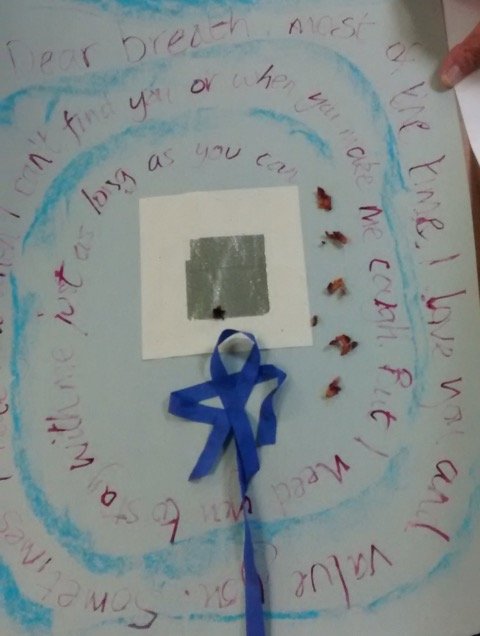
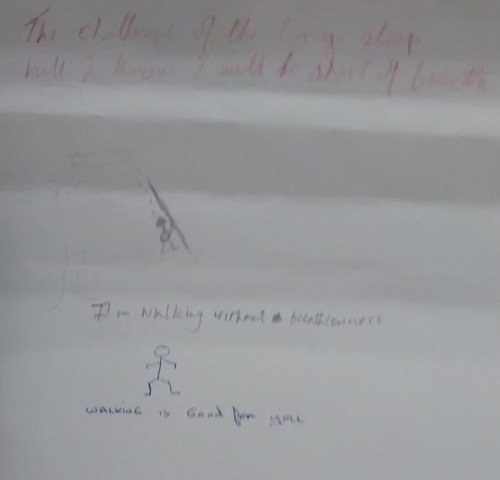
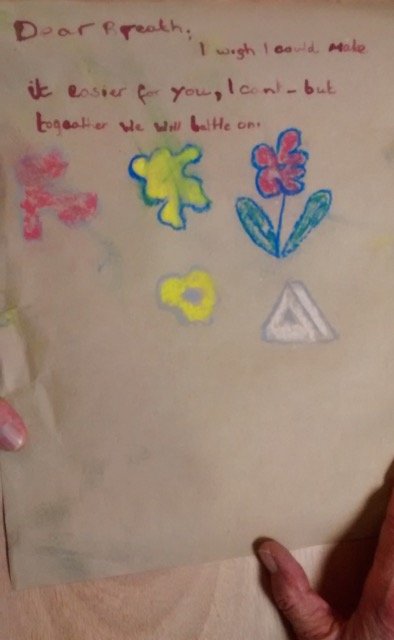
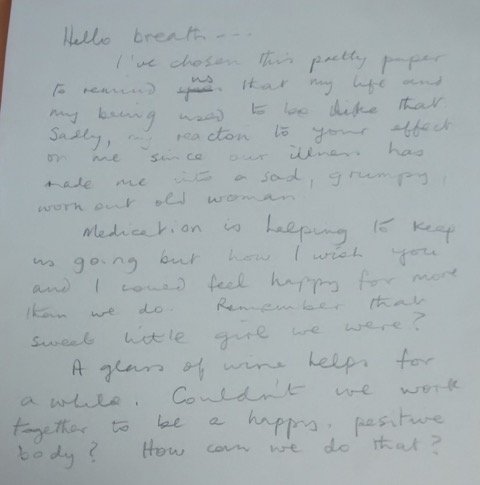
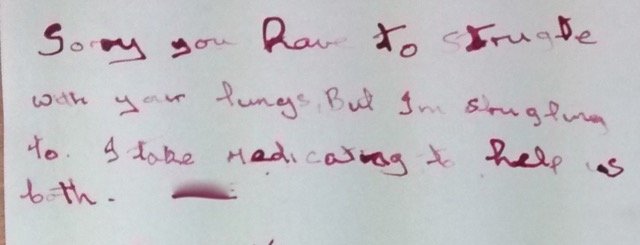
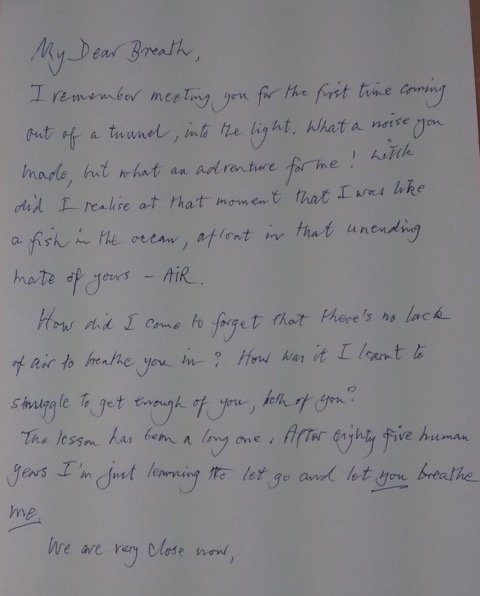
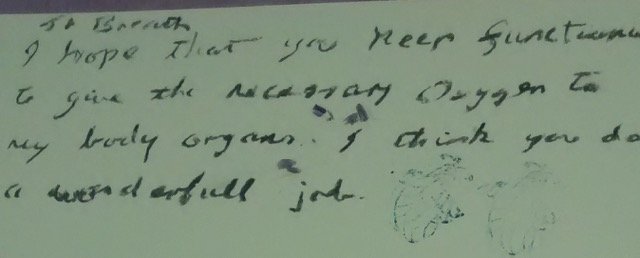
Thank you to: Mike Green, chair of the Forest of Dean Breath Easy group for all his help and for the photos (when I discovered I’d left my camera behind); all the participants, whose names have been changed for purposes of privacy; Great Oaks Hospice, Coleford for their welcome; Dr Alice Malpass, NIHR Research Fellow, for referring me to Forest of Dean Breath Easy group after we both delivered talks at the Life of Breath research group; and Jess- Farr Cox and Havi Carel, for inviting me to talk at that group meeting.

